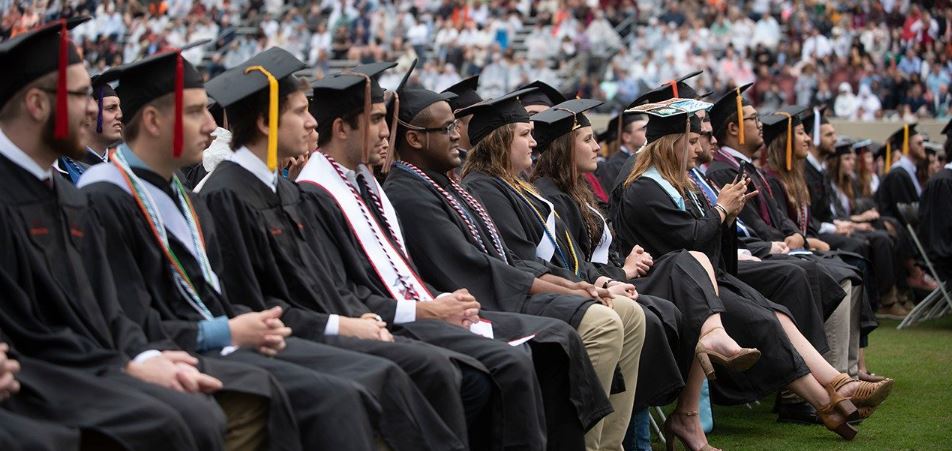I don’t know what was considered deficient with the main Virginia Tech commencement ceremony — too white? too heteronormative? insufficiently diverse? — but the university this year provided ten supplementary graduation programs for African-Americans, Hispanics, Jews, Muslims, gays, and other groups.
Apparently, the administration deemed it inadequate for some students to revel in what they shared in common as Hokies, graduates of one of America’s more prestigious universities, or as young people embarking upon their life journeys as adults, or even, dare I say, as Americans. They needed an opportunity to celebrate their cultural identities. Well, some of them did. If they were of English, German, Irish, Scotch-Irish, Italian, or Polish descent, or if they were Catholic, Protestant or some other denomination of Christianity, there were no special Cultural Achievement ceremonies to attend.
But if students were of African-American descent, they could participate in the university-sponsored Donning of the Kente ceremony. If they were of Hispanic-Latino background, there was the Gesta Latina. There was a ceremony for American Indians & indigenous people, and another one for Asians. There was a special ceremony for Jews and one for Muslims. There was a ceremony for international students, and a ceremony for members of the lesbian, gay, bisexual, transgender, queer, and ally community. Oh, and there was even one for students in recovery and one for veterans.
According to a Virginia Tech feature story, the special ceremonies advance the university’s mission to ensure the success of all students, particularly those from underrepresented and historically marginalized populations.
“One thing I always said is the Hokie identity should add to your other identities, not take away from it,” said Yolanda Avent, senior director of Tech’s Cultural and Community Centers. “There are ceremonies that really celebrate that and all our students’ unique identities.”
“It’s really important to our students to have their cultures represented in ways that sometimes aren’t represented in the greater graduation ceremonies,” Avent said. “I think a lot of it is affirming students in spaces where they are not always affirmed and seeing themselves.”
Bacon’s bottom line: In other words, Virginia Tech’s mission has morphed beyond educating students, and beyond making sure that all students feel welcome on campus. Now the university must affirm students’ cultural, religious, or racial identities — well, the identities of “historically marginalized” students at least. Apparently, maintaining one’s cultural identity is not something students and their families are capable of doing on their own. They need the university’s help.
A number of observations…
First, it’s not clear to what extent these cultural achievement ceremonies arose in response to a documented desire of the students or reflect the obsessions of the college administration. How many students actually attend these ceremonies? Does a significant percentage of all African-Americans, Hispanics, and other minority groups attend? Or do these ceremonies give Tech’s diversity bureaucracy something tangible to do and justify its existence?
Second, who invented these ethnic classifications? Just as, in many cases, there were no “tribes” in African countries until English colonizers decided to lump together inhabitants sharing linguistic and pre-colonial political affiliations, the cultural imperialists of U.S. universities are forging ethnic identities where none existed previously. A ceremony for Hispanics and Latinos? No such ethnic identity existed in Latin America — “Hispanic” identity is a construct of American intellectuals and politicians. A ceremony for “Asians?” Are you kidding me? At least most Latinos share a language in common. Students of Chinese, Japanese, Korean, Filipino, Indian, and Pakistani descent share nothing in common culturally but their ancestors’ origins on the world’s largest, most diverse continent!
Third, a Hokie graduate might have come from a “marginalized” background, but when he or she has graduated with a Virginia Tech degree — especially if it’s an engineering degree — it is ludicrous to call them marginalized anymore. Their career prospects greatly exceed those of average Americans.
At root, the Tech administration’s obsession with race, ethnicity, and sexual affiliation is all about virtue signaling. And if that obsession perpetuates the demographic Balkanization and identity politics that propel Leftist causes in the United States, that’s not a bug, as Tech’s computer scientists might say. It’s a feature.
Update: No wonder we’re seeing more and more commentary like this. At some point half the country (the conservative half) will wake up, asking, why are we subsidizing people who preach collectivism, identity politics and the destruction of our way of life?



